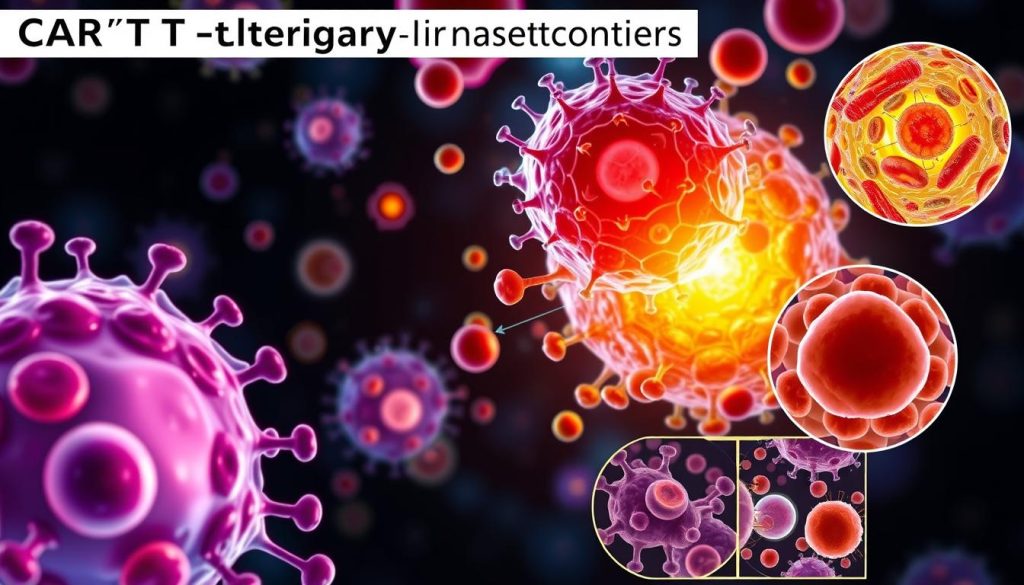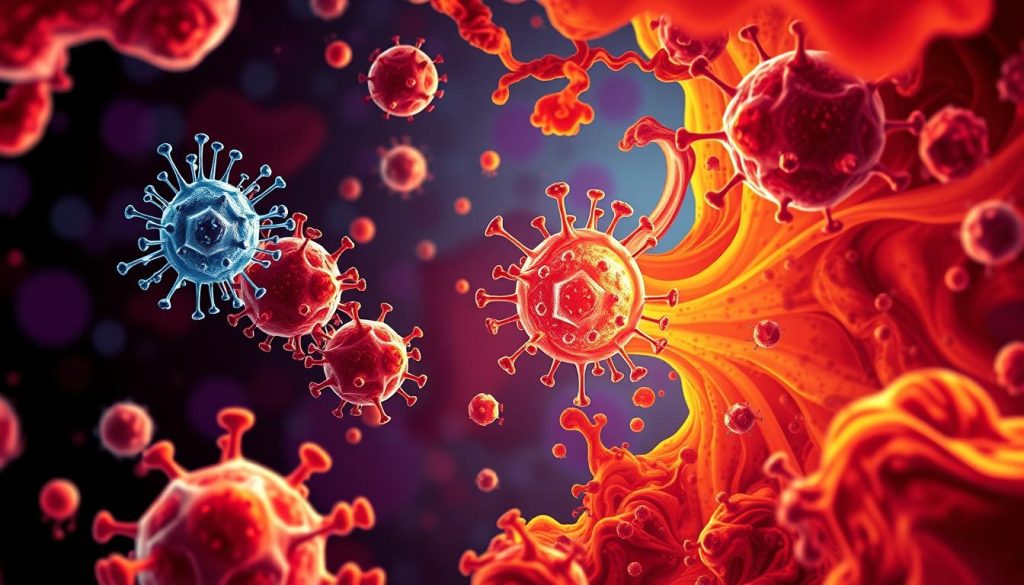CAR T cell therapy is a new hope for some blood cancer patients. It’s a groundbreaking treatment that has shown great success. But, it also has car t cell therapy risks and side effects that patients and caregivers need to know about.
Knowing the possible car t cell therapy complications is key. It helps in making informed decisions and getting the best care. This article will cover the side effects of CAR T cell therapy. We’ll talk about common and rare car t cell therapy adverse reactions, how to manage them, and the importance of weighing the risks and benefits.
By educating patients, caregivers, and healthcare professionals, we aim to empower them. We want to help them make informed choices and improve treatment outcomes. Let’s explore the world of CAR T cell therapy and its side effects together.
Understanding CAR T Cell Therapy
CAR T cell therapy is a new way to fight cancer. It uses a patient’s own immune system to attack cancer cells. This method changes T cells to find and kill cancer cells better.
The first step in CAR T cell therapy is taking T cells from the patient. These cells are then changed in a lab to fight cancer. After that, millions of these cells are given back to the patient.
How CAR T Cell Therapy Works
After the cells are given back, they start to find and kill cancer cells. The CAR protein helps them find the right cells. This way, they can kill cancer cells without harming healthy cells.
Benefits of CAR T Cell Therapy
CAR T cell therapy is very effective against some blood cancers. It has helped many patients who didn’t respond to other treatments. This treatment is a big hope for those with advanced or relapsed cancers.
Even though CAR T cell therapy is promising, it’s important to know its risks. Understanding its safety and how patients is key. Patients should talk to their doctors to see if it’s right for them.
Common Side Effects of CAR T Cell Therapy
CAR T cell therapy is a hope for some patients with blood cancers. But, it’s important to know the side effects of CAR T cell therapy. The main CAR T cell therapy toxicities are cytokine release syndrome, neurological issues, and blood problems. Knowing these side effects helps patients and their families prepare for treatment.

Cytokine Release Syndrome (CRS)
Cytokine release syndrome (CRS) is a big inflammatory response. It happens when the immune system is very active, like during CAR T cell therapy. Symptoms can be mild, like fever and tiredness, or severe, like low blood pressure and breathing problems.
Neurological Toxicities
Neurological side effects from CAR T cell therapy include:
- Confusion or delirium
- Headaches
- Tremors or seizures
- Speech difficulties or aphasia
These problems usually start within a few weeks after treatment. They can be managed with careful monitoring and the right treatments.
Hematologic Toxicities
Patients may face blood-related side effects from CAR T cell therapy. These can affect blood cell counts and clotting. The side effects include:
| Toxicity | Description |
|---|---|
| Neutropenia | Low levels of neutrophils, a type of white blood cell that fights infection |
| Anemia | Low levels of red blood cells, which carry oxygen throughout the body |
| Thrombocytopenia | Low levels of platelets, which help with blood clotting |
Patients might need blood transfusions or growth factor support. This helps until their blood cell counts get better.
“It’s key for patients to work closely with their healthcare team to manage any side effects during CAR T cell therapy.”
Cytokine Release Syndrome (CRS) Explained
Cytokine release syndrome (CRS) is a common side effect of CAR T cell therapy. It happens when the immune system gets very active. This activity releases a lot of inflammatory molecules called cytokines.
These cytokines can cause symptoms ranging from mild flu-like symptoms to serious complications. The severity of CRS can vary from person to person.
CRS is graded from 1 to 4 based on symptoms. The grading system looks at fever, hypotension, oxygen need, and organ function. Here’s a table showing the signs and symptoms for each grade:
| Grade | Signs and Symptoms |
|---|---|
| 1 | Fever, mild hypotension, no oxygen requirement |
| 2 | Fever, hypotension requiring fluids or low-dose vasopressors, oxygen requirement < 40% |
| 3 | Fever, hypotension requiring high-dose or multiple vasopressors, oxygen requirement > 40% |
| 4 | Life-threatening symptoms, ventilator support, organ failure |
CRS usually starts within the first week after CAR T cell infusion. Symptoms often peak around day 5-7. Early recognition and prompt management of CRS are key to avoiding severe complications and ensuring the best outcomes for patients.
“CRS is a double-edged sword. On one hand, it shows the CAR T cells are working against the cancer. On the other hand, it can cause significant toxicity and needs close monitoring and management.”
Understanding CRS and its effects on patients is vital for healthcare providers. By keeping up with the latest in CRS management and side effect prevention, medical professionals can help patients through this complex treatment.
Managing Cytokine Release Syndrome (CRS)
Cytokine release syndrome (CRS) is a common side effect of CAR T cell therapy. It can be severe. Healthcare providers use a grading system to manage CRS. This helps keep patients safe and reduces complications.

Grading CRS Severity
CRS is graded from 1 to 4. Higher grades mean more severe symptoms. The grading system looks at several factors, including:
- Fever
- Hypotension
- Oxygen requirement
- Organ dysfunction
Grading CRS accurately is key. It guides treatment and ensures timely intervention.
Treatment Options for CRS
Treatment for CRS varies based on its severity. It may include supportive care and targeted therapies. Some common treatments are:
| Treatment | Description |
|---|---|
| Supportive Care | Fever management, fluid resuscitation, and oxygen support |
| Tocilizumab | An IL-6 receptor antagonist that helps reduce inflammation |
| Corticosteroids | Used in severe cases to suppress the immune response and manage CRS |
Early recognition and prompt cytokine release syndrome treatment are vital. They help minimize CRS’s impact and improve patient outcomes.
“Managing CRS effectively requires a multidisciplinary approach and close collaboration between oncologists, intensive care specialists, and nursing staff.”
Neurological Side Effects of CAR T Cell Therapy
CAR T cell therapy is a breakthrough in treating blood cancers. Yet, it can cause side effects, including neurological issues. These can be mild or severe and need careful monitoring and quick action to keep patients safe and improve their outcomes.
Neurological side effects can affect a patient’s brain function, movement, and speech. Common issues include:
Encephalopathy and Confusion
Encephalopathy, or brain dysfunction, is a possible side effect. Patients might feel confused, disoriented, or have changes in mental status. These symptoms can vary and need close attention and support.
Seizures and Tremors
Seizures and tremors can also happen after CAR T cell therapy. Seizures need quick medical help and treatment. Tremors can make daily tasks hard and must be managed well.
Speech Difficulties and Aphasia
Language problems, like trouble speaking or aphasia, can occur. Patients might find it hard to find words or understand them. Speech therapy and support can help them communicate better.
The severity of these side effects can differ from person to person, as shown in the table below:
| Neurological Toxicity | Mild | Moderate | Severe |
|---|---|---|---|
| Encephalopathy | 20-30% | 10-15% | 5-10% |
| Seizures | 5-10% | 2-5% | 1-2% |
| Speech Difficulties | 15-20% | 5-10% | 1-5% |
Working together, doctors, neurologists, and specialists are key to managing these side effects. Quick action and teamwork can lessen their impact and improve patient care.
Hematologic Side Effects of CAR T Cell Therapy
CAR T cell therapy has shown great success in treating blood cancers. Yet, it can cause side effects like hematologic toxicities. These car t cell therapy side effects mainly affect blood cells, impacting patients greatly.
Neutropenia is a common car t cell therapy hematologic toxicity. It’s when there are fewer neutrophils, a key white blood cell. This makes patients more likely to get serious infections, needing careful watch and support.

Anemia is another side effect, where there are fewer red blood cells. Red blood cells carry oxygen, and fewer can cause fatigue and shortness of breath. Some patients might need blood transfusions to help.
Thrombocytopenia, or low platelet count, is also a concern. Platelets help blood clot, and low numbers increase bleeding risks. Patients might get platelet transfusions to prevent bleeding.
The severity of these side effects varies among patients. Doctors closely watch blood cell counts during treatment. They use supportive care like antibiotics and transfusions to help manage these issues.
“The management of hematologic toxicities is a critical aspect of CAR T cell therapy, requiring a multidisciplinary approach and close collaboration between oncologists, hematologists, and supportive care teams.”
The table below lists common hematologic toxicities from CAR T cell therapy:
| Hematologic Toxicity | Description | Management |
|---|---|---|
| Neutropenia | Low neutrophil count, increased risk of infections | Prophylactic antibiotics, growth factors, monitoring |
| Anemia | Low red blood cell count, fatigue, weakness | Blood transfusions, erythropoiesis-stimulating agents |
| Thrombocytopenia | Low platelet count, increased risk of bleeding | Platelet transfusions, monitoring |
Research is ongoing to find better ways to handle these side effects. The goal is to improve patient outcomes and quality of life.
Infections and Immunosuppression Risks
Patients getting CAR T cell therapy face a higher risk of infections. This is because the treatment weakens the immune system. The engineered T cells fight cancer but also lower the body’s defenses, making it easier to get sick.
The treatment’s effects on the immune system can last weeks to months. During this time, patients are more likely to get infections. These can be bacterial, viral, or fungal.
- Pneumonia
- Urinary tract infections
- Bloodstream infections
- Reactivation of latent viruses, such as cytomegalovirus (CMV) or Epstein-Barr virus (EBV)
Increased Susceptibility to Infections
Several factors make patients more likely to get infections after CAR T cell therapy:
- Lymphodepletion: Before the therapy, patients get chemotherapy to make room for the T cells. This lowers the immune cells, making them more vulnerable.
- Cytokine release syndrome (CRS): The big release of cytokines during CRS weakens the immune system even more.
- B cell aplasia: Some CAR T cell therapies can cause a long-lasting drop in B cells. This weakens the body’s ability to fight infections.
Monitoring and Prophylaxis
To reduce the risks of infections and immunosuppression, it’s important to monitor and take preventive steps:
| Monitoring | Prophylaxis |
|---|---|
| Regular blood tests to check immune cell counts and function | Prophylactic antibiotics to prevent bacterial infections |
| Frequent clinical assessments for signs and symptoms of infection | Antiviral medications to prevent reactivation of latent viruses |
| Monitoring for specific viral reactivations (e.g., CMV, EBV) | Antifungal medications in high-risk patients |
| Prompt initiation of diagnostic tests and targeted treatment for suspected infections | Immunoglobulin replacement therapy for prolonged B cell aplasia |
By knowing the risks of infections and taking the right steps, healthcare providers can help patients through this tough time. This way, they can lessen the effects of immunosuppression-related problems.
Long-Term Side Effects and Monitoring
CAR T cell therapy has shown great success in treating blood cancers. But, it’s important to watch for long-term side effects. The full impact of car t cell therapy long-term effects is not yet fully understood.

Patients need ongoing car t cell therapy follow-up care to stay healthy. This care includes regular visits to the oncology team. They check for toxicity and disease recurrence through physical exams, blood tests, and imaging studies.
Follow-Up Care and Surveillance
The follow-up schedule varies based on the patient and the treatment. A typical plan might be:
| Time After Treatment | Follow-Up Frequency |
|---|---|
| First 3 months | Every 1-2 weeks |
| 3-6 months | Every 1-3 months |
| 6-12 months | Every 3-6 months |
| After 1 year | Every 6-12 months |
Healthcare providers watch for car t cell therapy long-term effects like delayed cytokine release syndrome and neurological toxicities. They also check for secondary malignancies.
Potential Late-Onset Side Effects
Some side effects of CAR T cell therapy can last long after treatment. These include:
- Prolonged cytopenias (low blood cell counts)
- Chronic fatigue
- Cognitive difficulties
- Endocrine dysfunction
- Secondary malignancies
“Long-term follow-up and monitoring are critical components of CAR T cell therapy care. By staying vigilant and proactive, we can help patients navigate any car t cell therapy long-term effects and ensure the best possible outcomes.”
Research is ongoing to understand car t cell therapy long-term effects. This helps in developing ways to prevent and manage these side effects. As we learn more, car t cell therapy follow-up care will evolve to better support patients.
Patient Experience and Quality of Life
Getting CAR T cell therapy can change a patient’s life, both during and after treatment. This new therapy gives hope to many cancer patients. But, it’s key to know the possible side effects and how they affect daily life.
Patients might feel tired, sick to their stomach, and in pain. These symptoms can make it hard to do simple things. The recovery time is long, needing patience and support from family and doctors.
“The first few weeks after my CAR T cell therapy were challenging. I felt exhausted and had trouble even getting out of bed some days. But with the help of my family and the medical team, I gradually regained my strength.” – Sarah, CAR T cell therapy recipient
Feeling emotionally well is also important. The worry and stress of cancer treatment can hurt mental health. Patients might feel anxious, sad, or have mood swings as they go through their treatment.
Having social support is key to a good quality of life after CAR T cell therapy. Talking to others who have gone through it, joining groups, and relying on family and friends can help. It gives a sense of community and helps patients deal with the tough times.
Even with side effects, many patients say their life gets better after CAR T cell therapy. The chance for long-term remission or even a cure brings hope and purpose.
As research keeps getting better, the aim is to lessen the side effects’ impact on patients’ lives. This way, the good from CAR T cell therapy can be more than the bad. Healthcare providers can help more by focusing on the patient’s experience and quality of life. This makes the cancer treatment journey easier for everyone.
Preparing for CAR T Cell Therapy Side Effects
Starting your CAR T cell therapy journey means getting ready for possible side effects. Learning about them and working with your healthcare team can help. This way, you can handle these issues and stay positive during treatment.

Patient Education and Counseling
Your healthcare team will teach you about CAR T cell therapy and its side effects. They’ll talk about common issues like cytokine release syndrome (CRS), neurological problems, and blood issues. They’ll also show you how to spot and report these problems.
You’ll learn what to look for and why talking to your doctors is key. They might give you books or videos to help you understand the treatment and its effects on your body.
Caregiver Support and Resources
Caregivers are very important for patients getting CAR T cell therapy. They help with daily tasks, offer emotional support, and watch for side effects. Many places offer support and resources for caregivers.
These resources include:
- Educational workshops and support groups
- Access to social workers and counselors
- Help with caring for the patient at home
- Guidance on dealing with healthcare and money issues
Using these resources, caregivers can feel more ready to support their loved ones during CAR T cell therapy.
Remember, knowledge is power. The more you and your caregiver know about CAR T cell therapy side effects, the better you’ll be to face challenges.
Advancements in Managing CAR T Cell Therapy Side Effects
Researchers are making big strides in managing the side effects of CAR T cell therapy. They are working hard to reduce toxicities and improve patient outcomes. This means more people can benefit from this life-saving treatment.
One major focus is on cytokine release syndrome (CRS). Scientists are looking into targeted therapies like tocilizumab and siltuximab. These could help control the inflammation caused by CRS. They are also exploring next-generation CAR T cells with safety switches and gene editing to reduce side effects.
Another area of research is using biomarkers to predict and monitor side effects. By identifying specific markers, doctors can take action early. This personalized approach could greatly improve patient care and outcomes.
“The future of CAR T cell therapy lies in our ability to harness its incredible while minimizing the risks. By investing in research and developing innovative strategies to manage side effects, we can ensure that more patients can benefit from this groundbreaking treatment.”
Advanced technologies like artificial intelligence and machine learning are also being used. These tools can analyze large amounts of data to predict complications. This allows for early intervention and tailored care plans.
As CAR T cell therapy advances, it’s important for everyone to stay updated on side effect management. By working together and using the latest research, we can make this treatment even better. It offers hope and improved quality of life for many people fighting cancer.
Balancing Benefits and Risks of CAR T Cell Therapy
When thinking about CAR T cell therapy, it’s key to look at both sides. This treatment has shown great success in fighting some blood cancers. But, like any treatment, it comes with risks and side effects.
Patients and their families should talk openly with doctors. They need to think about the good and bad sides of CAR T cell therapy. This includes the chance of getting better or living longer, but also the risk of side effects.
Weighing Treatment Options
Choosing CAR T cell therapy depends on many things. These include the patient’s health, age, and what they want. Doctors can explain what might happen and other options too. This way, patients can choose what’s best for them.
Discussing Concerns with Healthcare Providers
Talking openly is important when deciding on CAR T cell therapy. Patients should ask questions and share their worries. Doctors can help by giving advice, support, and resources. This helps patients make choices that improve their life and health.
FAQ
Q: What are the most common side effects of CAR T cell therapy?
A: CAR T cell therapy can cause several side effects. These include cytokine release syndrome (CRS), neurological issues like encephalopathy, and problems with blood cell counts. These effects can be mild or severe and need careful monitoring.
Q: How does cytokine release syndrome (CRS) develop after CAR T cell therapy?
A: CRS happens when T cells multiply fast and release a lot of inflammatory cytokines. This can cause a body-wide inflammatory response. Symptoms can range from mild to severe, affecting organs and needing immediate attention.
Q: What neurological side effects can occur following CAR T cell therapy?
A: Neurological side effects include brain dysfunction, confusion, and seizures. Other symptoms are tremors, speech issues, and language problems. It’s important to watch for these closely and treat them quickly.
Q: Are there any long-term side effects associated with CAR T cell therapy?
A: Long-term effects of CAR T cell therapy are being studied. Patients might face ongoing or delayed side effects. Regular check-ups are key to catch and manage these issues early.
Q: How can patients prepare for the side effects of CAR T cell therapy?
A: Educating patients about the therapy’s side effects is critical. Doctors should explain the risks and how to manage them. Patients and their families need support and resources during treatment.
Q: Are there any advancements in managing the side effects of CAR T cell therapy?
A: Yes, researchers are finding new ways to reduce side effects. They’re improving the therapy’s safety and effectiveness. This includes better manufacturing and combining CAR T cells with other treatments.
Q: How can patients and caregivers make informed decisions about CAR T cell therapy?
A: Patients and caregivers should talk openly with doctors about the therapy’s benefits and risks. They should think about their personal goals and concerns. Understanding the side effects and management is key to making a decision.


















